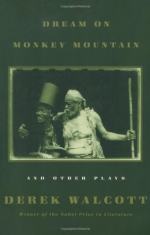|
This section contains 757 words (approx. 2 pages at 400 words per page) |

|
Monkey Mountain is depicted in the Prologue as "volcanic," which suggests unpredictability, slumbering violence, submerged and smouldering energies that will one day demand release. Makak's dream touches and taps these hidden energies and gives them form and substance in a way that the criminality of Tigre or Souris or the oppressive mentality of the corporal (themselves crude manifestations of the need for self-assertion, of a refusal to accept identitylessness) cannot. Makak repeatedly insists that his dream is not a dream, whereas others characterize it, not only as a dream, but a bad one. They are literalists, fatalistic and unimaginative, like the politicians whom Walcott describes as "generation after generation / heaped in a famine of imagination."Even though the charges that the corporal addresses against Makak clearly include incitement to rebellion, even though Makak himself declares that it is "better to die, fighting like men, than to hide...
|
This section contains 757 words (approx. 2 pages at 400 words per page) |

|




